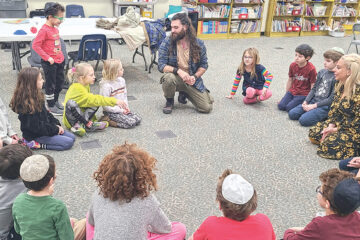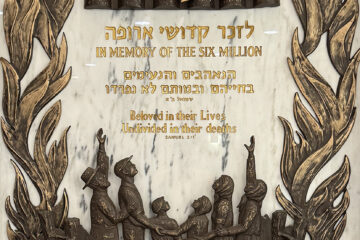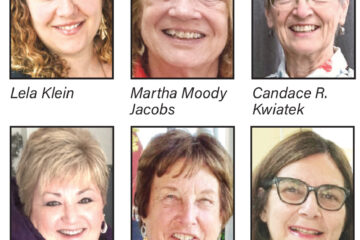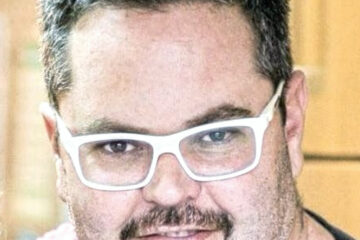Programming, collaboration, communication now focus of Federation strategic planning

By Marshall Weiss, The Dayton Jewish Observer
With results of the Jewish Federation’s online community survey and focus groups in hand, Federation’s strategic planning committee has launched three work groups to devise strategies to improve Federation’s performance based on community priorities.
Those priorities as indicated in the survey and focus groups are programming, collaboration, and marketing and communications.
The Federation received 277 responses to its online survey conducted at its website, jewishdayton.org, from April 1-21. Judy Horowitz, a consultant for Jewish Federations of North America, conducted six focus groups and seven interviews, with a total of 64 community members. Those interviewed included young adults, interfaith families, adults over 60, those who are marginally involved, community professionals, and adults ages 45-60. Horowitz is facilitating the Federation’s strategic planning process through a grant from JFNA.
Among the strong messages that came out of the survey, interviews, and focus groups are:
• The Federation’s message isn’t clear;
• People are ambivalent about giving money to Israel and overseas causes when they see the needs at home as significant and growing;
• There is a desire for more communitywide, cross-congregational and Federation coordination, collaboration and less duplication of programming.
Better collaboration
“There’s an overwhelming sentiment that there is not a real level of collaboration or cooperation among the synagogues and the Federation,” said Federation Executive Vice President Larry Skolnick. “People are frustrated that we’re not all working together, that the Federation and DJCC offer similar programs that are being offered in the synagogues. I think people’s feeling is: let’s get our act together and let’s really collectively think about a big communal picture and stop thinking about our own little piece of the pie.”
Mike Shane, who chairs the strategic planning committee with Lisa Pierce, said that message rang out loud and clear in the focus groups.
“People don’t really want to be part of the political infighting among these organizations,” Shane said. “And I think they’re looking to the Federation to play a leadership role in creating that environment of collaboration in the community.”
With that in mind, Skolnick said, the strategic planning committee’s programming work group will look at “what types of programming the Federation and its agencies should offer and what type of programming we want to look at funding others to do in the community.”
The work group for collaboration includes representatives from the Dayton area’s synagogues and Jewish organizations, Skolnick added.
Communicating more effectively
For Pierce, one of the most significant findings of the focus groups and interviews was the lack of understanding about what the Federation does.
“Even people who thought they knew what the Federation did, actually were oftentimes wrong,” she said.
“There seems to be a broad consensus view of what the Federation is, which is based upon what it was over the last 20 or 30 years,” Shane added.
Horowitz said the challenge of messaging is common for Federations. “It becomes even more complicated when you have a Federation (such as Dayton’s) that’s also the provider of service,” she said. “In addition, Dayton has some specific demographic challenges, certainly shared by other rust belt communities: the aging of the population, the fact that kids go away and don’t return.”
Allocation priorities
A finding that took some strategic planning committee members by surprise was the lower-than-expected priority of funding for Israel/overseas Jewish needs.
“There was a general cry from the community that with the backdrop of the challenging economic environment that we want to take care of our community first,” Shane said. “That seemed to weigh heavier on people’s minds than possibly the needs of Israel. Changing our relationship with Israel seemed to be the message.”
“Perhaps,” Horowitz added, “we need to think of new ways to engage with Israel that’s not always monetary in itself, making a 21st-century relationship with Israel.”
However, Skolnick added that respondents placed a high priority on Israel advocacy.
“I think the sentiment was that people care about Israel but it’s not a priority in terms of funding. And that’s the challenge,” he said. “And it was the same percentages across the board in terms of age. I thought you would see a much higher level of support for funding of Israel among the 65-plus group, but it was about the same as the 35- and 40-year-olds. That was startling to me.”
Federation programs and services that received the highest praise in the survey were the Jewish Senior Service Agency and DJCC Early Childhood Program.
“The survey and focus groups also validated some of the concerns we have,” Shane said. “There is a geographic divide that’s been created in the community, and how do we bridge that? There’s a shift in the age composition of our community and we’re trying to figure out how we can address the needs of the future community.”
The three work groups will come up with strategies and tactical suggestions for the overall strategic planning committee; their final recommendations will go to the Federation board before the end of the year. The Federation’s aim is to implement approved recommendations beginning in 2012.
“And that’s where the rubber meets the road,” Shane said. “Coming up with a plan is relatively easy. To execute it, it’s going to require that we unleash the passion in people to get them involved.”
Jewish Federation strategic planning
Online survey at JewishDayton.org, April 1-21, 2011 received 277 responses project — online survey key results
Profile of respondents
Female: 61%
Below age 35: 7%
65+: 30%
In Dayton area 20+ years: 72%
In Dayton area less than 10 years 16%
North suburbs: 27%
Downtown: 7%
South suburbs: 62%
With children below age 18 at home: 31%
Part of interfaith family: 27%
Been to Israel: 65%
Synagogue members: 79%
Have attended at least 1 Federation event: 80%
Have donated to United Jewish Campaign: 81%
Overall opinion of Federation
Very positive: 16%
Generally positive: 41%
Neutral: 25%
Don’t know/not sure: 3%
Generally negative: 11%
Very negative: 5%
Clear understanding of what Federation does
Agree strongly: 22%
Agree: 47%
Disagree: 22%
Disagree strongly: 4%
Don’t know: 5%
Importance of Federation services
On scale of 1 to 4, 1 not important, 4 very important. Listed from highest to lowest importance.
Combating antisemitism: 3.53
Local services for Jewish elderly: 3.40
Representing Jewish comm. in the media: 3.29
Local assistance & counseling for Jews: 3.27
Jewish preschool: 3.27
Teen/young adult social programs: 3.25
Israel advocacy: 3.12
Adult cultural & social activities: 2.99
Adult Jewish education: 2.87
Vulnerable populations, Israel/overseas: 2.84
Jewish day school: 2.81
Camping programs: 2.80
Educational Israel trips: 2.68
Source: Jewish Federation of Greater Dayton





